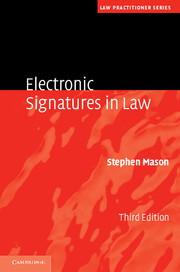Book contents
- Frontmatter
- Contents
- Preface
- Acknowledgements
- Table of cases
- 1 The signature
- 2 International initiatives
- 3 European Union Directive on electronic signatures
- 4 England and Wales, Northern Ireland and Scotland
- 5 International comparison of electronic signature laws
- 6 The form of an electronic signature
- 7 Digital signatures
- 8 Liability
- 9 Evidence
- 10 Data protection
- Index
- References
4 - England and Wales, Northern Ireland and Scotland
- Frontmatter
- Contents
- Preface
- Acknowledgements
- Table of cases
- 1 The signature
- 2 International initiatives
- 3 European Union Directive on electronic signatures
- 4 England and Wales, Northern Ireland and Scotland
- 5 International comparison of electronic signature laws
- 6 The form of an electronic signature
- 7 Digital signatures
- 8 Liability
- 9 Evidence
- 10 Data protection
- Index
- References
Summary
The Electronic Communications Act 2000
The first draft of a bill, the Electronic Communications Bill, was published in July 1999. This Bill was withdrawn when it attracted a great deal of wrath regarding key escrow (which is now expressly excluded in the Act by s14) and provisions that were later incorporated into the Regulation of Investigatory Powers Act 2000. The Electronic Communications Act received the Royal Assent on 25 May 2000, and extends to Northern Ireland. The Act is in three parts:
Part I: Cryptography service providers. This part of the Act provides for the establishment of a statutory register of approved providers of cryptography support services. It has not been implemented, and a voluntary scheme is in place. Further, by the terms of s16(4), Part I was repealed on 25 May 2005 because no order was made under s16(2) by the end of the period of five years beginning with the day on which the Act was passed.
Part II: Facilitation of electronic commerce, data storage, etc. This part is concerned with the legal recognition and admissibility of electronic signatures; permits the removal of statutory restrictions, which impose a requirement that a transaction must be in writing; and facilitates the use of electronic means to store information in an electronic format.
Part III: Miscellaneous and supplemental. This part makes a number of amendments to the Telecommunications Act 1984 regarding the modification of telecommunications licences, and also covers the usual matters including interpretation, the short title, commencement and the territorial extent of the Act.
Sections 7, 11 and 12 came into force on 25 July 2000 in accordance with the provisions of the Electronic Communications Act 2000 (Commencement No 1) Order 2000 (SI 2000 No 1798); section 4(2) was amended by section 82, Schedule 4(10) of the Regulation of Investigatory Powers Act 2000; section 15(1) was amended by section 406(1), Schedule 17(158) of the Communications Act 2003; and sections 11 and 12 were repealed by section 406(7), Schedule 19(1) of the Communications Act 2003.
- Type
- Chapter
- Information
- Electronic Signatures in Law , pp. 139 - 152Publisher: Cambridge University PressPrint publication year: 2012



